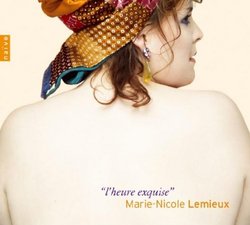| All Artists: Claude Debussy, Reynaldo Hahn, Ernest Chausson, Georges Enesco, Marie-Nicole Lemieux, Daniel Blumenthal Title: Marie-Nicole Lemieux ~ L'heure exquise Members Wishing: 1 Total Copies: 0 Label: Naive Original Release Date: 1/1/2005 Re-Release Date: 10/18/2005 Genres: Pop, Classical Styles: Vocal Pop, Opera & Classical Vocal, Historical Periods, Modern, 20th, & 21st Century Number of Discs: 1 SwapaCD Credits: 1 UPC: 822186050224 |
Search - Claude Debussy, Reynaldo Hahn, Ernest Chausson :: Marie-Nicole Lemieux ~ L'heure exquise
 | Claude Debussy, Reynaldo Hahn, Ernest Chausson Marie-Nicole Lemieux ~ L'heure exquise Genres: Pop, Classical
|
Larger Image |
CD Details |
CD ReviewsThe Creamy Contralto of Marie-Nicole Lemieux J Scott Morrison | Middlebury VT, USA | 11/07/2005 (5 out of 5 stars) "Marie-Nicole Lemieux, a qúebécoise not yet into her thirties, has a voice in a million. She burst on the recording scene with a CD of Handel arias, then sang a glorious Orlando in Vivaldi's 'Orlando furioso,' and then put out a less successful CD of Brahms lieder. Now she's back with a well-chosen clutch of mélodies by Georges Enesco, Reynaldo Hahn, Ernest Chausson and Claude Debussy. The CD is called 'L'Heure exquise' after the drop-dead beautiful Hahn song of that name, and for me it is the highlight of the disc. Lemieux's creamy tones embrace the bewitching verses and leave one almost stunned with their beauty. The same is true in Hahn's baroque-ish 'À Chloris.' Debussy's 'Fêtes galantes II,' set to ephemeral verses by Paul Verlaine, are a little less successful, although Lemieux is able to fine down the voice to an impressionistic whisper in 'Les ingénus' and 'Le faune.' One must mention the absolutely superb accompaniment supplied by pianist Daniel Blumenthal, a marvelous soloist in his own right. I was not at all familiar with the Enesco's 'Sept chansons de Clément Marot' (the poet little known to anglophones until memorialized so trenchantly in Douglas Hofstadter's book about the perils of translation, 'Le Ton beau de Marot') and they are a real find. I particularly like No. 3 'Aux damoyselles paresseuses d'escrire a leur amys' ('To the Damsels that are too lazy to Write to their Suitors') with its fetching piano accompaniment and the light-hearted but frustrated suitor's complaint. 'Estrene de la rose' ('The Gift of the Rose') could have been written by Debussy. Such luscious whole-tone harmonies to support the verses about Venus and Adonis. Chausson's songs have been marvelously recorded by the likes of Felicity Lott and Ann Murray and Lemieux has real competition here. Still, the quality of her voice is so scrumptious that her somewhat mushy diction does not particularly detract, but she does not get the meaning across nearly as well as the two British singers. This is odd when you consider that French is Lemieux's first language. This disc is a much better effort that the immediately preceding Brahms lied disc in which there were some troublesome mannerisms. They seem to be absent here. You must hear this voice. At times it reminds me of that of her countrywoman, Maureen Forrester, although it is not quite as large and is a good deal more flexible. She's a comer alright. Scott Morrison" An artist to watch Michael K. | 04/07/2007 (4 out of 5 stars) "This is the only readily available solo disc by the thirty-year-old contralto despite contributions to several baroque releases. She shows a remarkable affinity for the music of Hahn, whose songs are most represented of the composers chosen. Although not supplanting the revelatory album of Susan Graham, Lemieux's mix of familiar and more obscure melodies by that quintessential Parisian prove she commands the subtlety of nuance and precarious balance between classicism and sensuality that his music evinces. Tempi are on the brisk side, which does not preclude a coherently narrative version of Trois jours de vendage, which can seem episodic in other readings. The five songs to Robert Louis Stevenson texts are given a performance neither sentimental nor studied, a clear notch above the only competition on disc. Daniel Blumenthal's accompaniments avoid indulgence almost to a fault, though listeners who find this repertoire's sweetness potentially cloying will thank him. (The wrong bass note near the end of A Chloris is inexplicable, however.)
The archaically tinged Enesco songs- no trace of Romania here- and eerie Chausson works (compare his setting of Verlaine to Hahn's L'heure exquise) were wonderful introductions for me, while a group of three short Debussy settings make for the strongest stylistic contrast within in the program. Hopefully Lemieux will make further recorded forays beyond the eighteenth century." |

 Track Listings (27) - Disc #1
Track Listings (27) - Disc #1